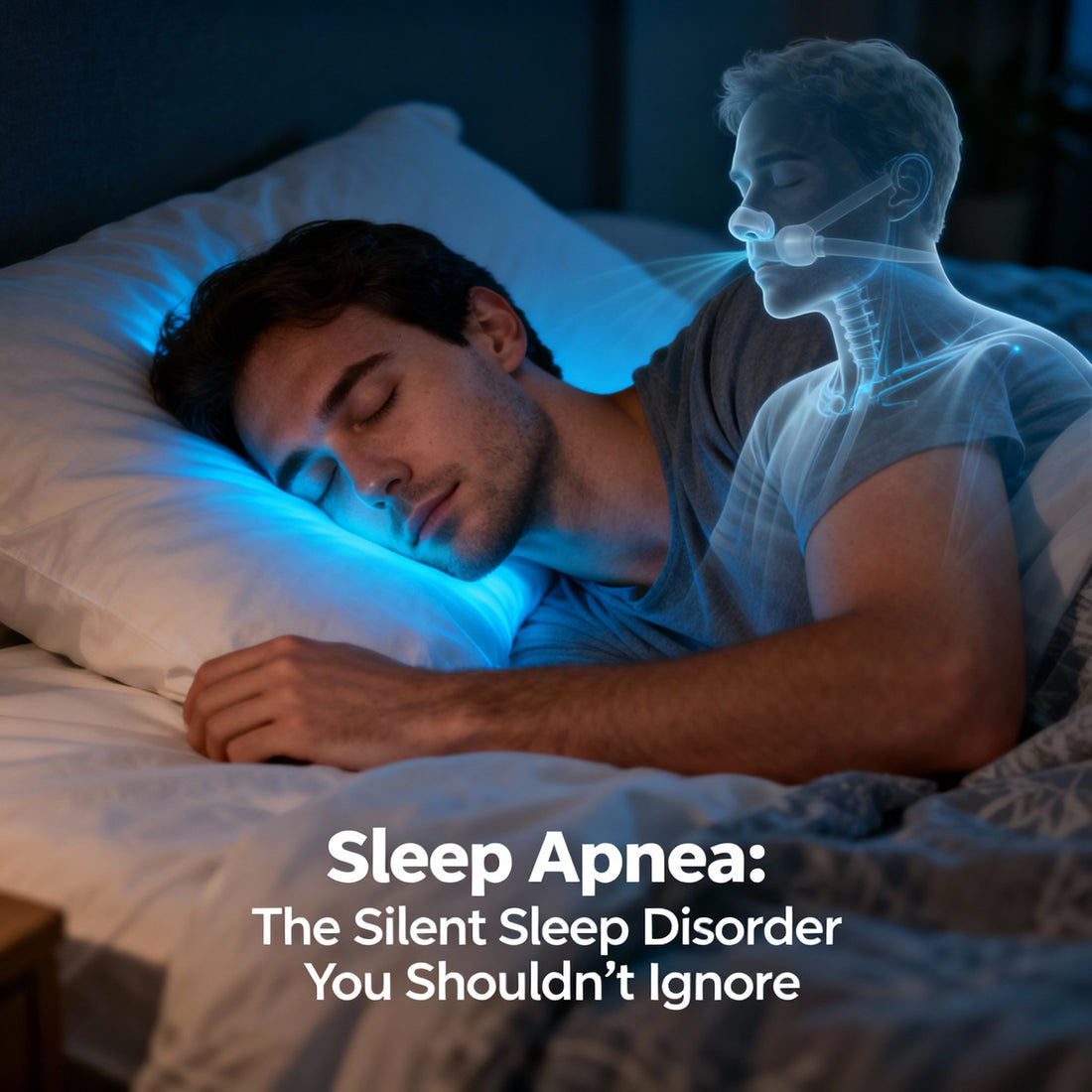
Sleep Apnea: The Silent Sleep Disorder You Shouldn’t Ignore
Share
Have you ever woken up feeling tired, no matter how long you slept? Or has someone told you that you snore loudly or stop breathing for a few seconds during the night?
If yes, you might be dealing with a serious but often overlooked condition called Sleep Apnea.
Sleep apnea doesn’t just disrupt your sleep — it can silently affect your heart, brain, and overall health. Let’s understand what it is, how to recognize the signs, and what you can do to treat it.
What Exactly Is Sleep Apnea?
Sleep Apnea is a sleep disorder in which breathing repeatedly stops and starts during sleep. These interruptions reduce the amount of oxygen that reaches your brain and body.
There are two main types:
- Obstructive Sleep Apnea (OSA): The most common type, caused when the muscles in your throat relax and block your airway.
- Central Sleep Apnea (CSA): Occurs when your brain doesn’t send proper signals to the muscles that control breathing.
Some people may even experience a combination of both, known as complex sleep apnea.
Common Symptoms of Sleep Apnea
Sleep apnea can affect anyone, but many people don’t realize they have it. The symptoms often appear subtle at first.
Watch out for these common signs:
- Loud, continuous snoring that disturbs others
- Pauses in breathing during sleep (often noticed by your partner)
- Gasping or choking sensations during the night
- Feeling excessively tired during the day
- Morning headaches or dry mouth
- Difficulty concentrating, memory issues, or mood swings
If several of these sound familiar, it’s worth talking to a healthcare provider.
Why Sleep Apnea Is Dangerous
Sleep apnea doesn’t just cause poor sleep — it impacts your entire body. Over time, untreated sleep apnea can increase the risk of:
- High blood pressure and heart disease
- Type 2 diabetes and metabolic problems
- Stroke and other cardiovascular issues
- Depression, anxiety, and memory problems
- Fatigue-related accidents while driving or working
Your body depends on deep, uninterrupted sleep for repair and energy. When that’s interrupted night after night, it takes a serious toll on your health.
Who Is at Risk?
Certain factors make sleep apnea more likely, such as:
- Being overweight or obese
- Having a large neck or narrow airway
- Being male or middle-aged
- Family history of sleep apnea
- Smoking or drinking alcohol before bed
- Nasal congestion or sinus issues
However, sleep apnea can affect anyone — including women, children, and even fit adults.
Effective Treatments for Sleep Apnea
The good news is that sleep apnea is treatable. With the right approach, you can improve your sleep quality and protect your long-term health.
Here are some effective treatment options:
- Lifestyle Changes
- Maintain a healthy weight
- Avoid alcohol and smoking
- Sleep on your side instead of your back
- Exercise regularly to improve breathing strength
-
CPAP Therapy (Continuous Positive Airway Pressure)
A CPAP machine delivers a steady flow of air through a mask, keeping your airway open throughout the night. It’s one of the most effective treatments for obstructive sleep apnea. -
Oral Appliances
Custom-fitted dental devices can help reposition your jaw and tongue to improve airflow during sleep. -
Surgery
In severe cases, surgery may be recommended to remove tissue or correct structural problems in the throat or nose.
When to See a Doctor
If you suspect you might have sleep apnea, don’t ignore it. Schedule a visit with your doctor or a sleep specialist.
They may recommend a sleep study (polysomnography) to measure your breathing patterns, oxygen levels, and brain activity during sleep.
Early diagnosis and treatment can make a life-changing difference.
Final Thoughts
Sleep apnea is often called a “silent disorder” because it happens while you sleep — but its effects are loud and clear in your daily life.
By paying attention to the warning signs and getting proper help, you can take control of your sleep, boost your energy, and protect your heart and mind.
🌙 Sleep Better. Live Healthier.
Don’t ignore the signs — talk to your doctor today and take your first step toward peaceful, restorative sleep.
